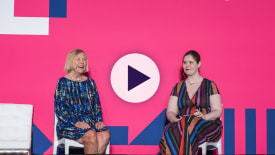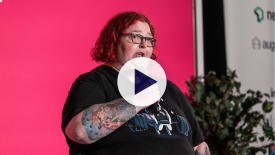
Latest videos
-
 In partnership with Eppo
In partnership with EppoFrom evals to experiments: How to ship successful AI initiatives by failing cheaply
Discover practical ways to blend qualitative evals with quantitative experiments to reduce risk, improve learning speed, and deliver impactful AI projects.
-

Taking a seat in the C-Suite: Transitioning from the highest-level operational roles to the executive team
A look at the transition to executive leadership, examining the skills, mindset, and priorities needed to succeed.
-

Transforming tradition: The journey to product-led growth
Learn how Dow Jones is embracing a product-first mindset to drive radical transformation and deliver innovative customer and consumer experiences.
-
 In partnership with Warp
In partnership with WarpFrom Prompt to Production: Making AI Work in Your Development Flow
Discover how to move beyond prompt experiments and design AI-first workflows that boost developer productivity and collaboration.
-

From hallucinations to hard truths: Real lessons in production AI
Learn crucial lessons from a year of scaling AI in FinTech: what broke, what burned, and what we’d do differently.
-

All of this has happened before
A mother-daughter conversation revealing how past tech trends mirror today’s AI hype and what we can learn.
-

Tackling tech debt
A seasoned CTO shares strategies and lessons on identifying, communicating, and effectively tackling tech debt across diverse companies.
Highlights from our conferences

Measure for Change
Picking metrics is one thing. But the harder decisions lie in what to do with them afterward.
View all videos from LeadDev London

Drive product gaps as an engineering leader
Discover practical strategies for engineering leaders to influence product development effectively, even in the absence of strong product management and a clear company vision.
view all videos from LeadDev NEW YORK

Growth in a downturn
In this talk, Smruti Patel asks, if hyper-growth is marked by spending more to make more, what does building for enduring growth look like?
view all videos from LeadDev berlin

Idea to Innovation
Join me as we embark on a journey to dissect the anatomy of innovation, uncover strategies to unlock the full potential of ideas, and transform them into impactful realities. Let’s build a strong culture of innovation, and make sure that it is not just a buzzword but a tangible outcome.
view all videos from staffplus london

Slack enterprise key management: Senior to staff lessons
Explore the key lessons and skills Audrei gained during their first Staff+ project, Slack Enterprise Key Management. This talk offers insights for anyone growing in their Staff+ career.
view all videos from staffplus NEW YORK
All videos
-

The promotion campaign
Without you leading a successful promotion campaign, that promotion is likely to fail, leaving you with disappointed engineers.
-

So you want to identify and nurture high performers?
Providing growth opportunities for the engineers in your team goes a long way toward motivating and retaining talent.
-

Alignment and clarity on promotions
As a manager, your role is to bring alignment and clarity to promotions
-

The impact of impact on motivation
Motivation is key, but how do you and your team stay connected to that motivation in the day-to-day?
-

Inclusive hiring is not a checkmark
Inclusion is the foundation of creating a level playing field for employees with all backgrounds to be heard, to be challenged, and to have an impact.
-

What’s fair?
How do people leaders impact the scales of fairness when they’re trying to be effective?
-

Why is inclusion important and what are the aspects of an inclusive team?
Diversity is important, but at the same time, if we do not have an inclusive environment, the diverse teams we build can fall apart.
-

The potential hidden inside a great 30-60-90 day plan
30-60-90 plans are a great way to set the tone and manage expectations with your new teammates.
-

How to onboard remote engineering staff in four weeks
Building a world-class onboarding program is a lot of work, but the alignment and empowerment it gives new staff is invaluable.
-

Understanding reorgs: What they are, why they happen, and how to navigate them
Strategy pivots, hiring freezes, and even layoffs are all leading to large reorganizations within remaining teams.
-

Three tactics to build resilience into your teams
When you build resilience, you’re able to recover quickly from challenges.
-

Change is going to come. Are you ready?
The only constant in life is change. As a leader, it’s your job to be prepared.
-
 In partnership with Sauce Labs
In partnership with Sauce LabsBuilding a better testing culture
How can engineering leaders create a healthy testing culture with clear strategies in place?
-

Making the manager of manager’s mindset
Suzan Bond covers the difference between the two roles and the key mindset shifts leaders need to make to manage managers.
-

What DevOps teams need to know in 2023
How can we create a healthy DevOps culture that supports user retention?
-

How do you build a great team culture? LMGTFY
In this talk, Jenn will bridge the gap between the instructions senior leaders often get, and the desired outcomes: a workplace where people feel safe to be themselves, ask questions, make mistakes, and grow together.
-

Evolving your core management skills: From IC to VP
This talk, will go through the core skills any leader needs evolve, as you go first from directly building software, to building teams that build software, to building leaders that build teams that build software.
-

Networking: The map is not the territory
When you’re looking to network and find peers while in a leadership position, it’s helpful to rethink some of our mental maps of how we position ourselves with others. Taking a different lens to the various folks around you — beyond titles and years of experience — can help widen your network and surprise you with different types of support you can gain.
-

Realizing a technical strategy during turbulent times
In this talk, Bruce shares the lessons he learned from his multi-year journey to define a technical strategy, from the excitement of a new job and team, to facing the harsh realities, exploding complexities and now embarking on the next phase of the strategy.
-

The business value of an engineering year
In this talk Ian will cover the best practices that bridge the gap between how business leaders talk about value vs how software development teams tend to.
-

Leveling-up your leadership team
In this talk IBK will share how you, as a leader, can take a topic and work on it with your team. IBK will also share an example topic and the format that he shared with senior leaders at Shopify.


